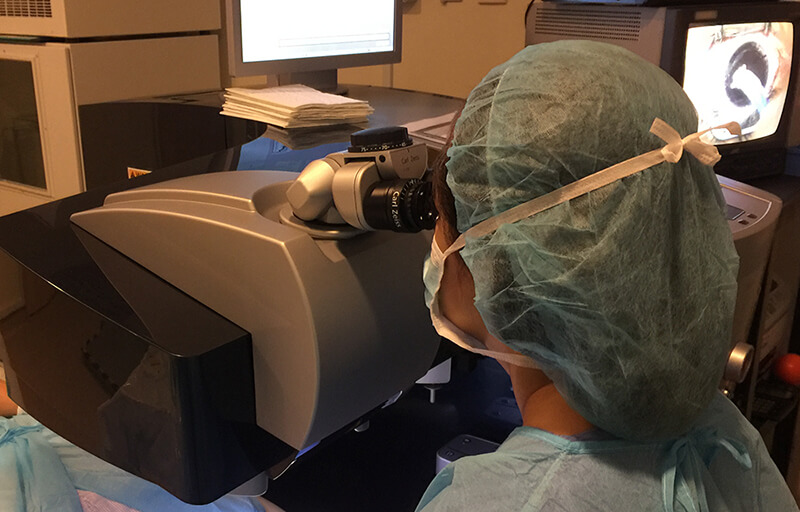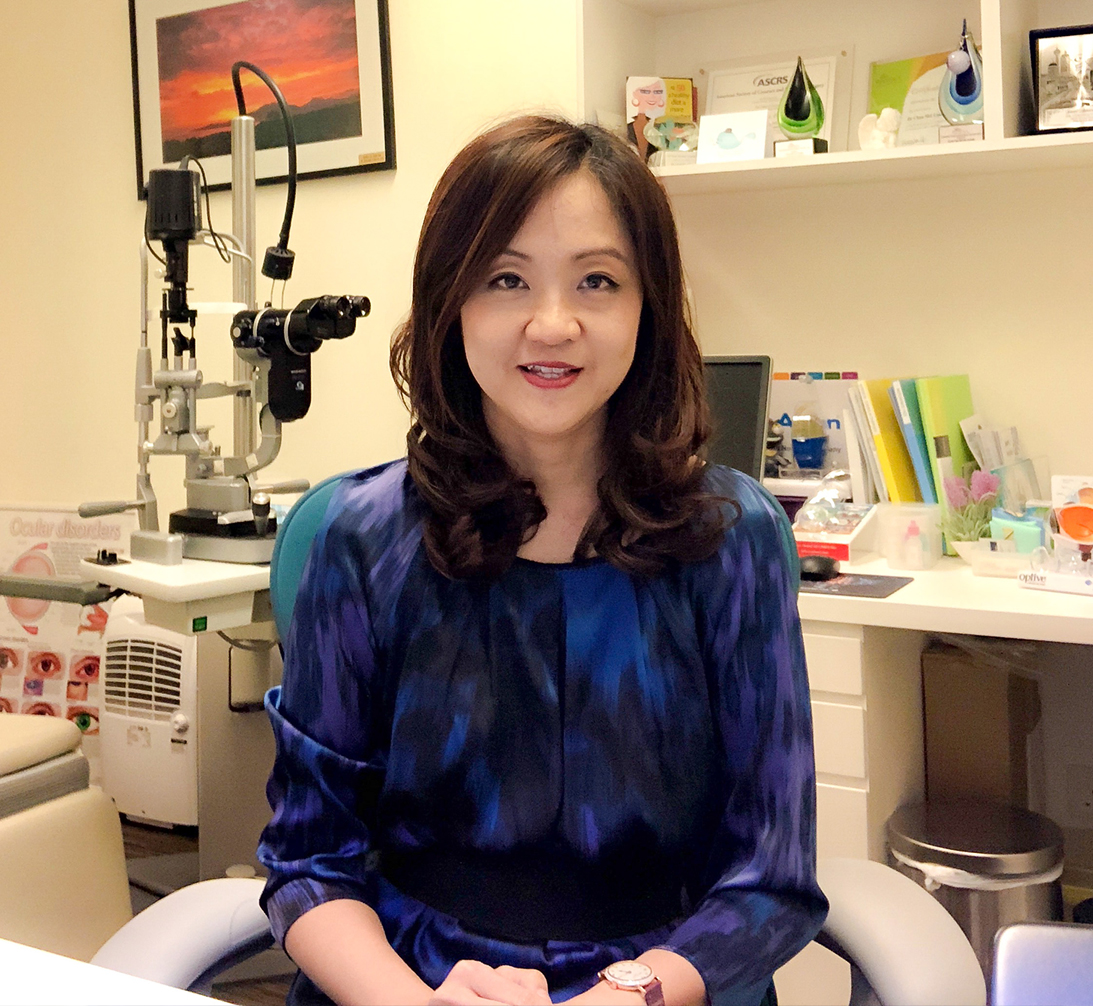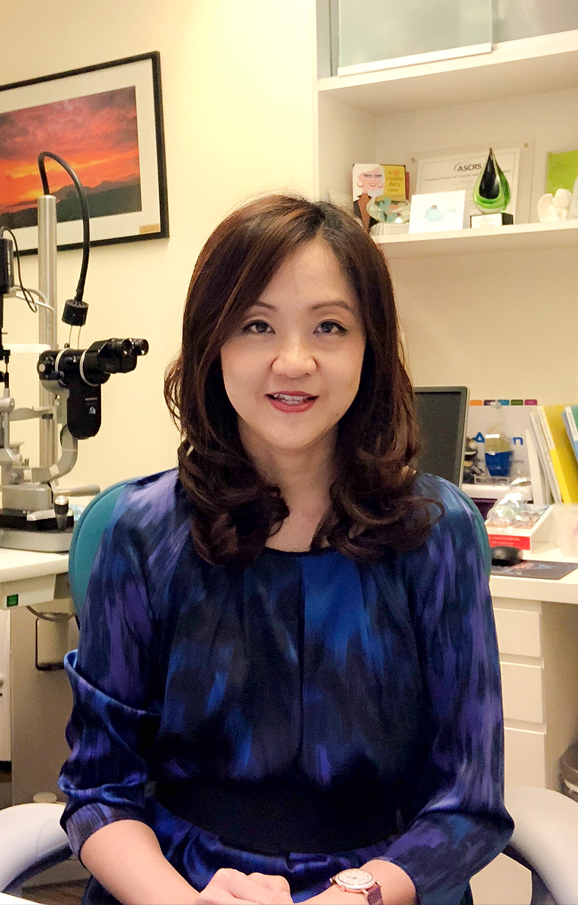LASIK Surgery in Singapore
LASIK in Singapore
LASIK is the most commonly performed laser eye surgery procedure that reshapes the cornea, allowing light to focus on the retina more effectively, without the use of glasses or contact lenses.
In Singapore, where myopia affects around 65% of children by age 12 and over 80% of adults, LASIK provides an option for many to reduce or eliminate dependence on corrective eyewear for clear distance vision.
What is LASIK Eye Surgery?
LASIK, or laser in situ keratomileusis, is an outpatient surgical procedure used to treat:
- Short-sightedness (myopia) In myopia, the cornea is too steep or the eye is too long, causing light to focus in front of the retina. LASIK flattens the central cornea so light focuses precisely on the retina, improving distance vision.
- Far-sightedness (hyperopia) In hyperopia, the cornea is too flat or the eye is too short, making light focus behind the retina. LASIK steepens the central cornea to shift the focus forward onto the retina, enhancing near and mid-range vision.
- Astigmatism Astigmatism occurs when the cornea is irregularly shaped, causing distorted or blurred vision at all distances. LASIK smooths and evens out the corneal curvature, allowing light to focus evenly.
Your Singapore LASIK Surgeon will use a special laser to reshape the cornea to improve the way light rays focus on the retina (the light-sensitive “film” at the back of the eye).
LASIK is performed to decrease your reliance on glasses and contact lenses. In most cases, spectacle and contact lens independence is achieved.
Most people who have undergone LASIK surgery in Singapore continue to enjoy good vision for many years. Many are even able to participate in sports and swimming without any issues.
However, it is important to understand that vision testing is typically conducted under optimal conditions in a clinical setting. In real-life situations, especially in dim lighting, your vision may not be as sharp as it is in bright daylight. As a result, you may still need supporting glasses for tasks such as reading or night driving.
Do note that if you are beyond 45 years of age and require glasses for reading (a condition called presbyopia or “lau hua”), you will probably still need your reading glasses after LASIK. There are other options for presbyopia management which your LASIK surgeon will be able to discuss with you. Some people choose a vision correction method called monovision which leaves one eye slightly short-sighted to allow for close work, while the other eye is adjusted for distance vision. Monovision works well for some patients, and your eye doctor will help you decide if you are suitable for this.
Am I a Good Candidate for LASIK Eye Surgery?
Not everyone can have LASIK or will benefit from it. Your LASIK eye surgeon will advise you accordingly.
Generally, in order to undergo LASIK surgery in Singapore, you should:
- Be at least 21 years of age
- Not be pregnant
- Be free of other eye diseases
- Have a stable refraction i.e. the prescription for your glasses shoold not have changed much in the last one year
- Fulfil certain criteria with regards to cornea thickness, cornea shape and refractive error (degree). Patients with thin or irregular corneas, severe dry eye, cataract, glaucoma, uncontrolled diabetes, rheumatoid arthritis and other collagen vascular diseases are unsuitable for LASIK.
Most importantly, you must have realistic expectations about the outcome of the procedure and be willing to accept the potential risks associated with it. Fortunately, LASIK is very safe, and the results are excellent; most patients are extremely happy with how the procedure has changed their lives.
What to Expect Before the LASIK Procedure
Before your LASIK procedure in Singapore, your ophthalmologist will discuss your vision goals and review your prescription stability to ensure you are a good candidate. You may also be advised to stop wearing contact lenses beforehand, as they can temporarily alter your cornea’s shape.
Additionally, your pre-LASIK evaluation typically includes:
- A comprehensive eye exam with pupil dilation
- Corneal mapping and thickness measurements
- Screening for conditions like dry eye, glaucoma, or corneal abnormalities
How is LASIK Eye Surgery performed?
LASIK is performed as an outpatient procedure. Here is what happens:
- You will be awake during the surgery and no sedation is necessary.
- The surgery is generally a comfortable experience with minimal pain.
- The eye is numbed with anaesthetic eye drops.
- A first laser, called the femtosecond laser, is used to create a thin piece of tissue (the flap) on the cornea.
- The flap is gently lifted.
- A second laser, the excimer laser, is then used to reshape your cornea.
- The flap is replaced and smoothed out. No sutures (stitches) are necessary. The flap adheres (sticks) on its own.
- It generally takes 10-15 minutes to perform LASIK in both eyes.
In some cases, a contact lens that acts like a bandage is placed over the cornea to allow proper healing of the flap to occur. This will be removed by your LASIK surgeon, usually the next day.
The advanced eye-tracking technology ensures precision even if your eye moves or blinks; it automatically pauses and adjusts the laser beam accordingly. The system handles any sudden movements, like sneezing, coughing, or itching, the same way. Once you reposition your eyes, the treatment will continue precisely where it left off.

What to Expect After LASIK Surgery
- Visual recovery after LASIK is amazingly quick, but not instantaneous.
- You will find that your eye sight is still foggy immediately after LASIK. Vision usually improves gradually over the next 6 to 8 hours. By the next day, you will be able to see well enough to perform most of your daily activities.
- When the effect of the anaesthetic eyedrops wears off, some patients may experience pain, tearing, burning sensation, scratchiness and/or difficulty opening their eyes, the severity of which varies from patient to patient. These symptoms usually disappear after 6-8 hours. Most patients find the discomfort mild and bearable.
- Healing after LASIK is usually more comfortable than with other methods of surgery as the laser removes tissue from the inside of the cornea rather than from the more sensitive surface of the cornea.
- You will be prescribed antibiotic and steroid eye drops as well as artificial tears to keep the eyes moist.
Most patients are able to return to work a day or two later. Stabilization of vision takes a few weeks, and varies from patient to patient.
LASIK Surgery Recovery & Aftercare
Recovery is essential for proper healing and reducing the risk of complications. Right after LASIK, your eyes are more sensitive to irritants and infection.
Key aftercare tips:
- Limit screen time for the first 24–48 hours; rest your eyes as much as possible.
- Avoid rubbing your eyes, even if they feel itchy or watery.
- You may shower the next day, but keep water, soap and shampoo out of your eyes for at least a week.
- Avoid swimming or hot tubs for 2–3 weeks to prevent infection.
- Light exercise is fine after a few days; delay contact sports and dusty outdoor activities for 2 weeks.
- Avoid smoking as it may slow healing and worsen dry eyes.
- Use your prescribed lubricating eye drops as directed.
Results After LASIK
LASIK eye surgery has a high reported success rate in Singapore, with many clinics noting that over 90% of patients achieve 20/20 to 20/40 vision without corrective lenses. While initial improvements are often seen within days, full visual clarity may take several weeks or months.
Although LASIK corrects existing refractive errors, it does not prevent natural, age-related changes. Individuals over 40 may still develop presbyopia (difficulty with near vision) and require reading glasses. In some cases, enhancement procedures may be considered to refine visual outcomes or address changes that occur over time.
What Are the Risks and Side Effects of LASIK?
These include dry eye, fluctuating vision, hazy vision, haloes and glare in a dim environment and light sensitivity. Over- and under-correction may also occur, and a “top up laser” procedure called “enhancement” may be required in some cases. Serious side effects that can result in loss of vision are extremely rare, and these include severe inflammation, infection and corneal ectasia (weakening and thinning of the cornea)
Am I Suitable for LASIK Surgery?
Your ophthalmologist may advise against LASIK surgery in the following cases:
- Prescription has changed significantly in the past year
- Corneas are too thin or have conditions like keratoconus
- Chronic dry eye
- Corneal scars, dystrophies or a history of eye injury/infection
- Myopia, hyperopia or astigmatism beyond the treatable range
- Advanced glaucoma, significant cataracts or recurrent eye infections
- Uncontrolled diabetes or autoimmune disorders
- Pregnant or breastfeeding
However, do not despair! Alternatives to LASIK are available. Our LASIK surgery clinic provides a wide variety of refractive surgical procedures in Singapore that aim to give good vision. If you are not suitable for laser refractive surgery, we offer more alternatives. These include:
- ReLEx SMILE
- Advanced surface ablations (TransPRK, LASEK, EpiLASIK)
- Implantable Contact Lens (ICL) insertion
Why Choose Our Clinic for Your LASIK Procedure?
Choosing the right LASIK clinic is an important decision. At our centre, Dr Cordelia Chan brings close to 30 years of experience and a strong track record in laser eye surgery, ensuring safe and effective results.
If you are considering LASIK, schedule an appointment with our ophthalmologist to explore your options with confidence. Contact us today to schedule an appointment.
MBBS (S’pore), FRCS (Edinburgh), MMed (S’pore), FAMS (Ophth)


Dr Cordelia Chan is a highly experienced ophthalmologist who has performed LASIK and other forms of Refractive Surgery for over two decades. She was the former Head, Refractive Surgery Service, Singapore National Eye Centre and during her career at SNEC, she was involved in the growth, teaching, research and development of LASIK and Refractive Surgery in Singapore. Thousands of patients in Singapore and the region, including physicians, surgeons and ophthalmologists, have had LASIK and Refractive Surgery performed by Dr Chan. She is internationally renowned in her field and has been invited to give lectures and conduct training courses at the annual meetings of the American Society of Cataract and Refractive Surgery (ASCRS), European Society of Cataract and Refractive Surgeons (ESCRS), and the Asia-Pacific Academy of Cataract Surgery, among others.
